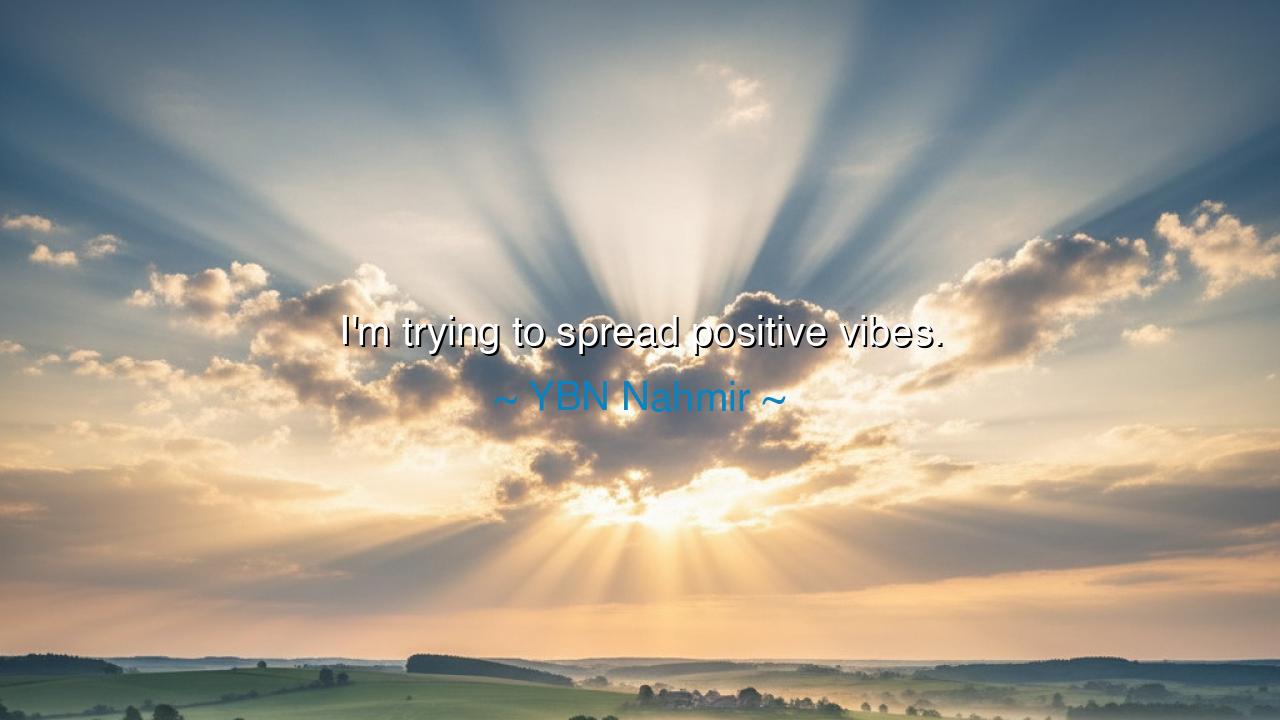
I'm trying to spread positive vibes.






When YBN Nahmir declared, “I’m trying to spread positive vibes,” his words may seem simple, yet they carry the weight of an ancient truth: that the energy a person carries within himself radiates outward and shapes the world around him. To spread positive vibes is not merely to smile or to speak kindly — it is to consciously choose to be a source of light in a world often covered in shadow. It is to be like the sun, which does not hoard its warmth but pours it freely upon all who dwell beneath the sky.
The ancients understood this principle deeply. In the East, sages taught of the unseen currents of life — chi, prana, spirit — that flow through all living beings. When kept pure and positive, this energy brings harmony, health, and peace. When darkened with anger or despair, it brings division and decay. YBN Nahmir’s vow echoes this wisdom, for he seeks to become not a vessel of negativity, but a fountain of strength, gratitude, and joy for all who encounter his presence.
History itself offers us luminous examples of such figures. Think of Mahatma Gandhi, a man who lived in a time of oppression, yet chose to radiate peace and nonviolence. His words and actions spread positive energy across his nation, igniting a fire of freedom that burned without hatred. Or consider Mother Teresa, who walked among the poorest of the poor, yet carried a calm and gentle light that inspired millions. Their lives remind us that to spread positive vibes is not trivial — it is a revolutionary act of love.
Nahmir’s words also carry within them a challenge to the modern age, where negativity often spreads faster than light itself. In music, in media, in daily conversation, cynicism and bitterness can poison the heart. Yet he turns in the opposite direction, seeking to flood his art and his life with positivity, creating ripples that extend far beyond his own circle. In this way, he joins the long lineage of artists, poets, and prophets who understood that words are not just sounds, but seeds — and that if one sows positive seeds, a harvest of hope will follow.
At the heart of his declaration lies the law of reflection: what we give, we often receive. When we spread positive vibes, we strengthen our own spirit and invite others to do the same. A kind word can soften anger; a hopeful song can lift despair; a smile can heal loneliness. These are not small gestures, but sacred acts, for they remind every person that they are part of a larger tapestry of light.
The lesson for us is clear: do not underestimate the power of your own energy. Each day, you carry within you the ability to poison or to heal, to darken or to brighten. To follow Nahmir’s path is to choose consciously to lift others — not with grand speeches or great power, but with the daily radiance of positivity. This is a responsibility as much as it is a gift.
In practice, this means guarding your words and thoughts. When tempted to complain, speak instead of gratitude. When surrounded by despair, remind others of hope. When confronted with hatred, answer with patience. Share music, art, or even silence that uplifts the spirit. And most importantly, keep your own inner well filled with positive energy, so that what you give to others flows from abundance and not from emptiness.
Therefore, let us remember YBN Nahmir’s wisdom: to spread positive vibes is to become a beacon in a weary world. Do not withhold your light, but let it shine in every word, every act, every presence you bring into a room. For in doing so, you not only uplift others, but also transform yourself into a vessel of strength, peace, and joy — a living reminder that even in the darkest times, light still spreads.






DVTien Dung Vu
I’m intrigued by how spreading positive vibes interacts with personal authenticity. Is it enough to declare positivity, or does it require consistent actions that reflect the message? I’d like to discuss how public figures can model positivity effectively, and how audiences discern genuine intent versus surface-level statements in the content they consume.
MNMinh Ngoc
This quote prompts me to think about the ripple effect of positivity. Can small gestures or uplifting messages from public figures lead to larger cultural shifts, or is the impact mostly limited to individual perception? I’d like to explore examples of how music and social media content have been used to encourage optimism and whether there are measurable benefits to fans’ mindset or behavior.
GDGold D.dragon
I feel inspired by the idea of intentionally creating positive energy. But it also raises questions: how do you maintain positivity in the face of criticism or negativity, especially in public life? I’d like perspectives on coping mechanisms for artists and influencers who aim to spread good vibes consistently without feeling drained or overwhelmed by external pressures.
PBPink Black
Reading this evokes curiosity about the balance between promoting positivity and addressing real struggles. Can consistently spreading good vibes risk ignoring deeper societal or personal issues? I’d like to explore how artists and influencers navigate inspiring optimism while remaining honest about challenges, and whether audiences are more receptive when positivity is paired with authenticity and vulnerability.
BNPhan Thi Bich Ngoc
This makes me think about the power of influence. Can spreading positive vibes as a public figure actually impact fans’ mental health and attitudes, or is it mostly symbolic? I’m curious about the methods and consistency required to create genuine positivity and whether listeners respond differently depending on the authenticity and relatability of the message.